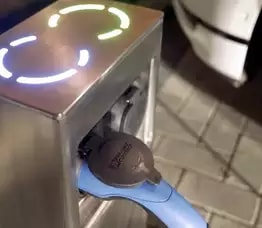Helping Europe’s most innovative cities take on the challenges of urbanization

City governments around the world are searching for more effective ways to address the environmental, social, economic and operational challenges presented by growing urbanization. Many are exploring the use of digital and wireless technologies to improve energy efficiency, mobility, air quality, safety and overall quality of life in the communities they serve.
Espoo, Finland and Leuven, Belgium are making innovative use of these technologies to make their cities smarter and more sustainable – and earning prestigious awards in the process. As part of these efforts, both cities are trialing smart street poles that will enable them to build a 5G and IoT infrastructure that can power a variety of digital applications and services. Nokia is proud to support these cities as a key partner, network solution provider and consultant.
Espoo, a pacesetter for intelligent communities
Espoo hosts northern Europe’s largest innovation and technology ecosystem, which strives to make the city more sustainable and resilient against the impacts of climate change. Its focus areas include expanding ultra-broadband access and developing cleaner and more efficient energy options for transport and home heating. The city aims to achieve the UN Sustainable Development Goals by 2025 and become carbon neutral by 2030.
Espoo has earned multiple awards for its efforts to build a smarter city. In 2020, the city’s Nokia-driven LuxTurrim5G ecosystem project won a 5G Innovation Award from Traficom, the Finnish Transport and Communications Agency. Contributions from LuxTurrim5G also helped Espoo earn runner-up honors in the 2020 European Capital of Innovation competition and win the Intelligent Community Forum’s 2018 Intelligent Community of the Year award.
The aim of the LuxTurrim5G project is to build a digital backbone to power a variety of smart city services. Nokia and its ecosystem partners are creating this backbone by integrating miniaturized 5G antennas and base stations, sensors, cameras, LED lights and other devices into innovative digital poles that can be installed throughout the city.
Data collected by the sensors provides a complete, real-time view of what is happening around the city. It is processed, analyzed and securely exposed through a local data marketplace. The ecosystem’s members can then use the data to develop digital services that support sustainable growth and enrich quality of life within Espoo.
The Nokia campus in Espoo acts as a test bed for LuxTurrim5G. It has hosted trial solutions for real-time environmental data collection, transportation, public safety, energy optimization and remote healthcare services. These solutions include the world’s first all-weather self-driving electric bus, named GACHA, which shuttles passengers between the campus and the nearest local railway station. The bus enables LuxTurrim5G partners to study the use of 5G connectivity for remote driving and gather valuable data from a moving sensor platform.
LuxTurrim5G has recently turned its attention to two new projects. The LuxTurrim5G+ project focuses on scaling and productizing the smart pole concept and extending the 5G pilot network in Espoo’s Kera neighborhood. The Neutral Host Pilot project focuses on enabling shared connectivity and a shared data marketplace, which will substantially reduce deployment and operating costs for mobile operators and digital service providers.
Leuven, European Capital of Innovation 2020
Leuven’s Digital City Pole project showcases the forward thinking that helped the city earn the 2020 European Capital of Innovation award. The project’s initial focus is to use smart poles with 5G to deploy electric vehicle (EV) charging stations and energy-efficient LED lighting solutions that can adapt to the changing lighting needs of a given scene throughout the day.
In the longer term, the city plans to use the project to help realize ambitious goals relating to the sustainable development of electromobility and autonomous public transportation. By distributing smart poles in business parks and urban areas, it aims to create a secure, high-performance connectivity and IoT infrastructure that can support ubiquitous smart city services beyond street lighting and EV charging.
For example, pole-mounted sensors or cameras could enable the city to measure pollution, track traffic congestion, monitor crowds or identify free parking spaces. With integrated 5G connectivity, the poles could provide a foundation for meeting the connectivity, capacity and latency demands of autonomous electric shuttles or taxis. These vehicles would help increase transport efficiency and make the city more sustainable.
Nokia innovations are behind the projects in Espoo and Leuven. The two cities have integrated our innovative 5G connectivity solution into smart urban infrastructures. Our Data Marketplace service will enable companies they work with to securely expose city data to provide new digital services that benefit citizens and visitors.
In both cases, we are operating within consortiums of local innovators that work closely with the cities to bring the innovation they need for their development. We strongly believe that successful city innovation requires tight collaboration among multiple players and stakeholders. We are pleased to share the honor of supporting some the most innovative cities in Europe with our many collaborators.
Find out more
Read our case study to discover how we’re helping Espoo build a 5G-powered platform for new digital city services.
Watch our video to find out more about Leuven’s Digital City Poles project and 5G integration for smart city initiatives.
Watch our webinar to get an in-depth view of how we’re helping to transform Leuven’s digital city poles into an intelligent infrastructure for IoT applications.
Visit our website to learn how our Future X cities solutions and platform approach can help you create innovative digital services that make your communities greener, more prosperous and livable.
Contact a Nokia city advisor to discuss a transformation plan that will enrich the lives, safety and well-being of your citizens.



